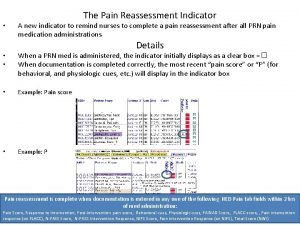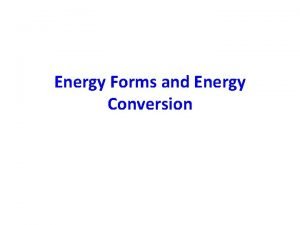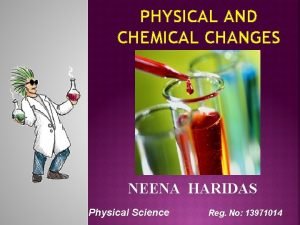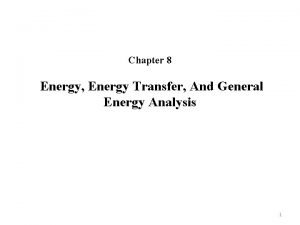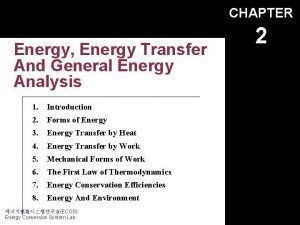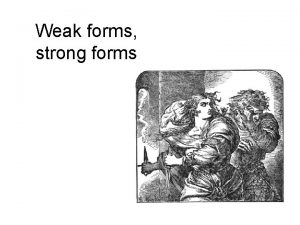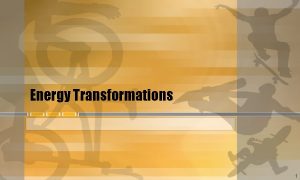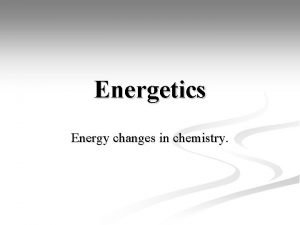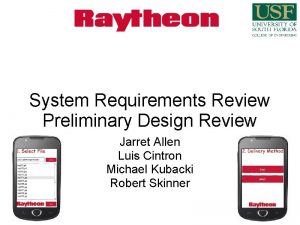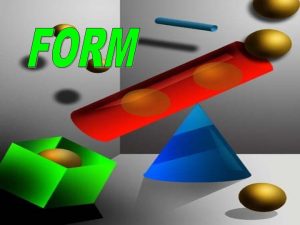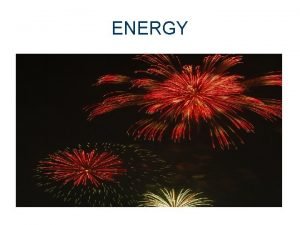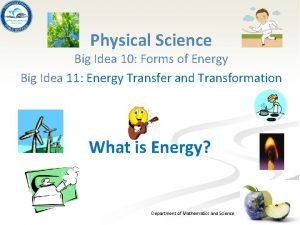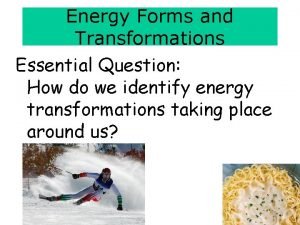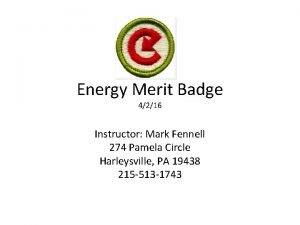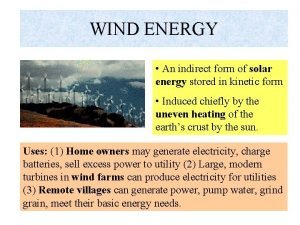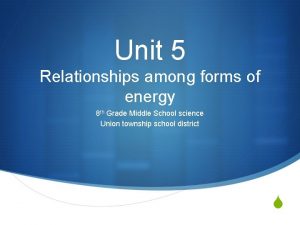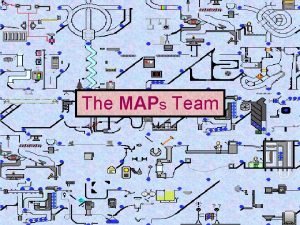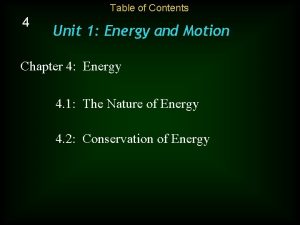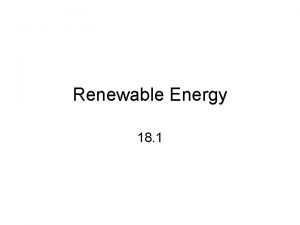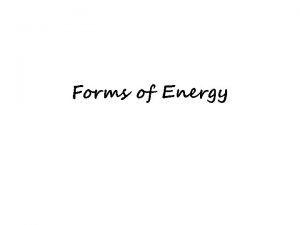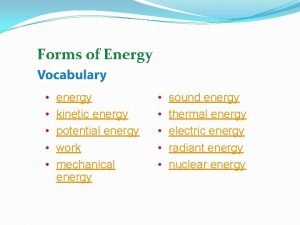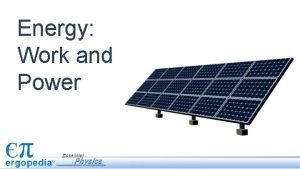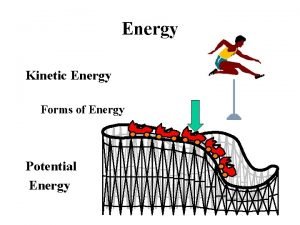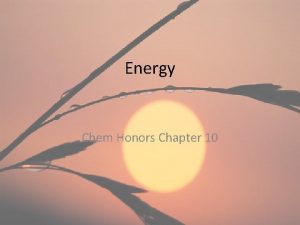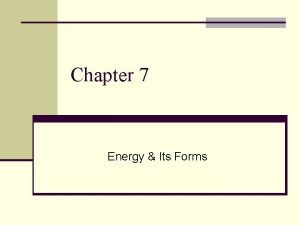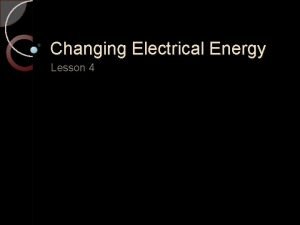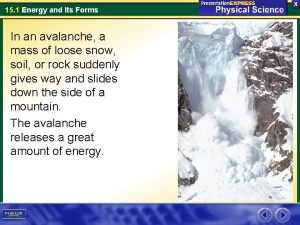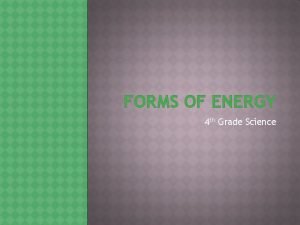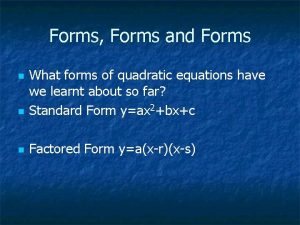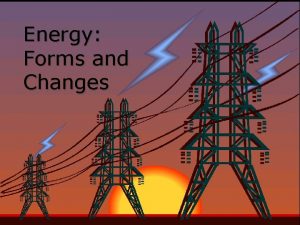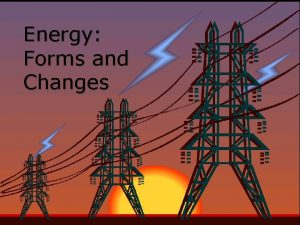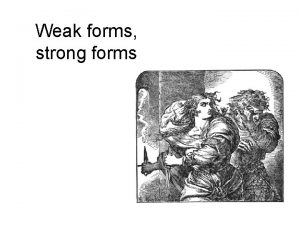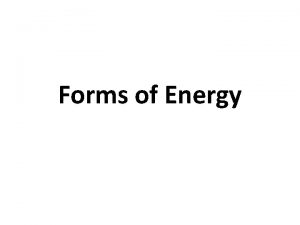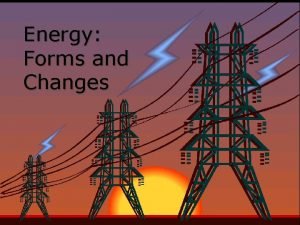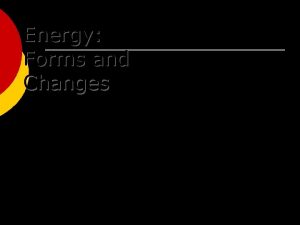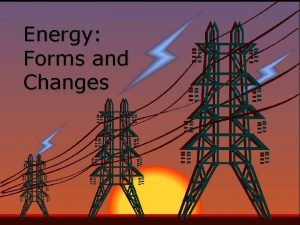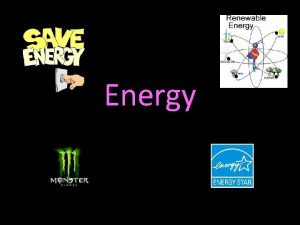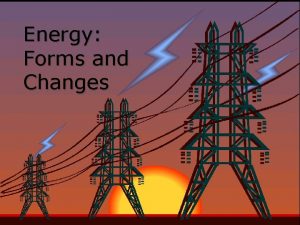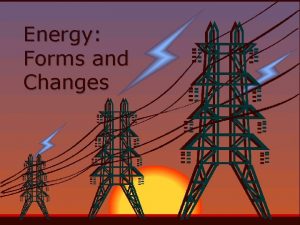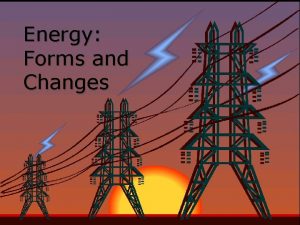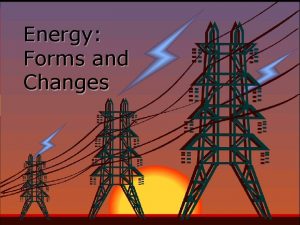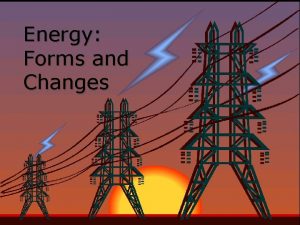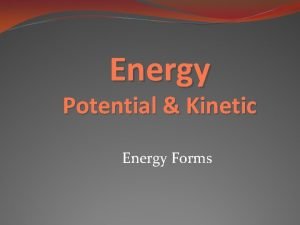Energy Forms and Changes Review Reassessment Requirements Go













































- Slides: 45

Energy: Forms and Changes Review

Reassessment Requirements Go through each slide and read carefully. After reading go back and take notes. Then study your notes !!!

Nature of Energy ■ Energy is all around you! – You can hear energy as sound. – You can see energy as light. – And you can feel it as wind.

Nature of Energy ■ You use energy when you: – hit a softball. – lift your book bag. – compress a spring.

Nature of Energy Living organisms need energy for growth and movement.

Nature of Energy – Energy can be defined as the ability to do work. – Work only occurs when something is using energy.

Forms of Energy The main forms of energy are: – – – – Heat Chemical Light Electric Nuclear Mechanical Sound

Mechanical Energy ■ When work is done to an object, it gains energy. The energy it gains is known as mechanical energy and is associated with the motion of something. ¡ It is the total of all the stored (or potential) energy AND the kinetic (moving) energy.

Example of Mechanical Energy ■ When you kick a football, you give mechanical energy to the football to make it move.

Example of Mechanical Energy When you throw a bowling ball, you give it energy. When that bowling ball hits the pins, some of the energy is transferred to the pins (transfer of momentum).

Mechanical Energy ■ Remember, mechanical energy is the energy an object has due to its motion or due to its position. Mechanical energy is all the: ■ kinetic energy (energy of motion) or ■ potential energy (stored energy of position). (we’ll learn more about these later in the PPT)

Kinetic Energy ■ The energy of motion is called kinetic energy. ■ The faster an object moves, the more kinetic energy it has. ■ The greater the mass of a moving object, the more kinetic energy it has.

Potential Energy ■ Potential Energy is stored energy. – Stored chemically in fuel, the nucleus of atom, and in foods. – Or stored because of the work done on it giving it THE POTENTIAL to move: ■ ■ Stretching a rubber band. Winding a watch. Pulling back on a bow’s arrow. Lifting a brick high in the air.

Electrical Energy ■ Power lines carry electromagnetic energy into your home in the form of electricity. Electrical energy is the energy in the movement of charged electrons (those things buzzing around the nucleus of an atom).

Radiant Energy ■ Light is Radiant energy. ■ Radiant Energy consists of electrically charged particles that travels in waves through space.

Heat Energy ■ The movement of atoms is called heat energy, because moving particles produce heat. ■ Heat energy can be produced by friction. ■ Heat energy causes changes in temperature and state of any form of matter (solid – liquid – gas). WATCH THIS NOW!!!

Nuclear Energy ■ The nucleus of an atom is the source of nuclear energy.

Nuclear Energy ■ Nuclear energy is we use comes from Uranium and is the most concentrated form of energy. This energy is then used to heat water to make steam to spin a turbine that spins an electric generator. WATCH THIS!!!

Chemical Energy ■ Chemical Energy is stored in the bonds between atoms. ■ And when bonds are broken, energy is released. ■ Remember the energy released in our Reaction In A Baggie Lab?

Chemical Energy ■ Fuel and food are forms of stored chemical energy. Food reacts with our bodies releasing energy and giving us the ability to move and function. WATCH THIS!!!

Sound Energy ■ Sound is the movement of energy through substances in longitudinal (compression/rarefaction) waves. Sound is produced when a force causes an object or substance to vibrate — the energy is transferred through the substance in a wave. Typically, the energy in sound is far less than other forms of energy.

Energy Conversion Energy can be changed from one form to another. Changes in the form of energy are called energy conversions. All forms of energy can be converted into other forms.

Energy conversions The sun’s light energy goes through solar panels and can be converted directly into electricity. ■ WATCH THIS!!!

Energy conversions Green plants convert the sun’s light (radiant energy) into starches and sugars (chemical energy).

Other energy conversions – In an electric motor, electric energy is converted to mechanical energy as it runs. – In a battery, chemical energy is converted into electric energy. – The mechanical energy of a moving waterfall is converted to electrical energy in a generator.

More Energy Conversions In an automobile engine: 1. the chemical energy in fuel is burned to convert 2. into heat energy. 3. The heat energy is then changed into mechanical energy to move the car. (it also turns into sound energy right!? )

Chemical Heat Mechanical

Kinetic-Potential Energy Conversion Roller coasters work because of the energy that is built into the system. Initially, the cars are pulled mechanically up the tallest hill, giving them a great deal of potential energy. From that highest point, the conversion between potential and kinetic energy powers the cars throughout the entire ride.

Kinetic vs. Potential Energy At the point of maximum potential energy, the car has minimum kinetic energy.

Kinetic-Potential Energy Conversions ■ As a basketball player throws the ball into the air, various energy conversions take place.

Ball slows down Ball speeds up

The Law of Conservation of Energy ■ Energy can be neither created nor destroyed by ordinary means. – It can only be converted from one form to another. – If energy seems to disappear, then scientists look for it – leading to many important discoveries. WATCH THIS!!!

Vocabulary Words energy mechanical energy heat energy chemical energy electromagnetic energy nuclear energy kinetic energy potential energy gravitational potential energy conversion Law of Conservation of Energy

Energy Transformation Review Practice You do not need to take notes on the following pages. This is practice to see how much you remember Look at the picture on each slide to see if you can tell what the energy transformation is: (energy form) to (energy form) GOOD LUCK!

1 Mechanical Energy (wind spinning turbine) Electrical (generator)

2 Chemical (match) Thermal Chemical (match) (heat) Radiant

3 Chemical (powder) Mechanical (it flies Chemical (powder) up) Light (oooh Chemical (powder) Sound (boom!)

4 REMEMBER atoms are splitting (fission) and joining (fusion) in the sun creating what kind of energy? ? ? Nuclear(from the sun) thermal Nuclear (from the sun) (heat)Radiant (light shining

5 Chemical (in batteries) Electric (to shine the light) Then… Electric (to shine the light) Radiant (light)

6 Electric (outlet) Mechanical (fan spins)

7 Chemical (food) Mechanical (you move)

8 Mechanical (moving hands) Heat (friction)

9 Chemical (in wood) Thermal Chemical (in(heat) wood) Radiant

10 Electric (from the outlet) Heat (from the dryer) Any others? ? ? ? ?

 Usps nrp phase 2
Usps nrp phase 2 Ca time now
Ca time now Andicator
Andicator Eroei
Eroei Elizabeth mulroney
Elizabeth mulroney Chemical change definition
Chemical change definition Energy energy transfer and general energy analysis
Energy energy transfer and general energy analysis Energy energy transfer and general energy analysis
Energy energy transfer and general energy analysis Short form i am not
Short form i am not Deteriminer
Deteriminer Enthalpy equation
Enthalpy equation Energy changing forms
Energy changing forms Energy changes
Energy changes What is thermochemistry
What is thermochemistry System requirements review
System requirements review Independent review requirements
Independent review requirements Why are related forms more agreeable than unrelated forms?
Why are related forms more agreeable than unrelated forms? Why are related forms more agreeable than unrelated forms
Why are related forms more agreeable than unrelated forms Why are related forms more agreeable than unrelated forms?
Why are related forms more agreeable than unrelated forms? What are the many forms of energy
What are the many forms of energy 10 types of energy
10 types of energy 100 examples of energy transformation
100 examples of energy transformation Comparative of superiority irregular adjectives
Comparative of superiority irregular adjectives Energy merit badge answers
Energy merit badge answers Ireton-jones equ. energy requirements in critical care pts.
Ireton-jones equ. energy requirements in critical care pts. Chapter review motion part a vocabulary review answer key
Chapter review motion part a vocabulary review answer key Uncontrollable spending ap gov
Uncontrollable spending ap gov Narrative review vs systematic review
Narrative review vs systematic review Search strategy example
Search strategy example Narrative review vs systematic review
Narrative review vs systematic review Wind energy is an indirect form of
Wind energy is an indirect form of All forms of energy
All forms of energy Grade level content expectations
Grade level content expectations What are the main forms of energy
What are the main forms of energy Six forms of renewable energy
Six forms of renewable energy Five form of energy
Five form of energy Form of energy
Form of energy How to increase potential energy
How to increase potential energy Is nuclear energy potential or kinetic
Is nuclear energy potential or kinetic Calorimeter constant
Calorimeter constant Forms of energy include
Forms of energy include What are the main forms of energy
What are the main forms of energy Forms of energy include
Forms of energy include What are 15 forms of energy?
What are 15 forms of energy? Energy foldable
Energy foldable Forms of energy jeopardy 5th grade
Forms of energy jeopardy 5th grade


